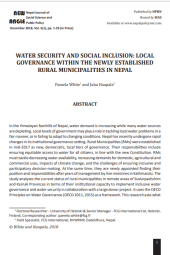Water Security and Social Inclusion: Local Governance within the Newly Established Rural Municipalities in Nepal
Summary
This document examines the water challenges in the Himalayan foothills of Nepal, where water demand is increasing while water sources are depleting. Local levels of government have the potential to address these issues fairly or may struggle to adapt to changing conditions. With recent institutional governance changes, Rural Municipalities (RMs) were established as new, democratic local tiers of governance in mid-2017. Their key responsibility is to ensure equitable water access for all citizens, aligned with the provisions of the new Constitution.
The study focuses on the current status of rural municipalities in the Sudurpashchim and Karnali Provinces, considering their institutional capacity to implement inclusive water governance and water security in collaboration with a large donor project. The research employs the OECD Principles on Water Governance as a framework to understand the existing water governance issues in this collaborative context. The document contains the identified opportunities for more accountable policy formulation closer to the community, with leaders who are representative and accountable to citizens and are well-informed about local water issues. However, there is a potential risk of policy formulation and governance accountability going astray. The conclusion emphasizes the importance of supporting these newly appointed rural municipalities and demonstrating ways to build their capacities to ensure safe water access for all. It highlights the critical moment to address water governance challenges and promote inclusive decision-making processes at the local level.
Categories:
Case Studies
Publisher:
NPRN
Published Year:
2018
